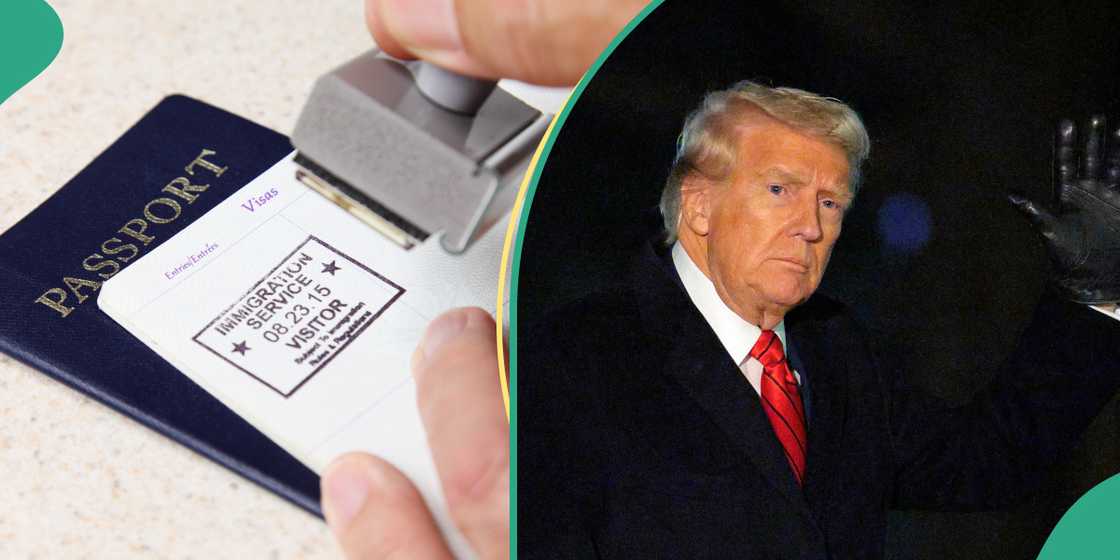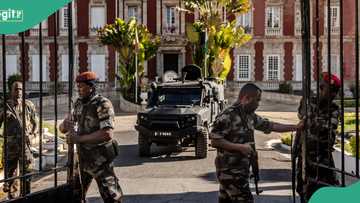Mali Hits Back at Trump, Slaps $10,000 Visa Bond on US Citizens
- Mali has imposed a $10,000 refundable visa bond on US citizens in direct retaliation for Washington’s new entry restrictions on Malians
- The move comes as both nations attempt to rebuild strained ties following years of political tension and shifting alliances
- US embassy in Bamako confirms the bond requirement, citing national security, while Mali calls it a matter of reciprocity and dignity
Mali has introduced a new visa requirement for United States nationals, demanding a refundable bond of up to $10,000 before granting business or tourist entry into the country.
The decision mirrors a similar policy recently implemented by the Trump administration against Malian citizens seeking entry into the US.

Source: Getty Images
Mali enforces $10,000 visa bond retaliation
In a statement released over the weekend, Mali’s Ministry of Foreign Affairs said the move was a direct response to Washington’s unilateral action, BBC reported.
The ministry stated that Bamako had decided to “establish an identical visa programme” for American visitors, describing the measure as necessary to preserve reciprocity and national dignity.
The US embassy in Mali confirmed the new policy on Friday, explaining that the original American measure was meant to strengthen “commitment to protecting America’s borders and safeguarding US national security.”
The embassy added that the United States remained open to “constructive engagement” despite the recent development.
Diplomatic tensions rise over US entry rules
The tit-for-tat policy shift comes amid renewed efforts by both nations to rebuild diplomatic and economic cooperation.
Just three months ago, a delegation of US officials visited Bamako to discuss counterterrorism coordination and trade opportunities, including exploration of Mali’s gold and lithium sectors.

Source: Twitter
However, relations between the two nations have been fragile since 2021 when General Assimi Goïta seized power in a coup. The transition disrupted ties with Washington and other Western allies.
Following the takeover, Goïta expelled French troops who had been stationed in Mali for nearly a decade and later invited Russian mercenaries from the Wagner Group to assist in counterinsurgency operations.
Wagner’s forces have since been replaced by Moscow’s Africa Corps under Russia’s Ministry of Defence.
Mali’s recent move also aligns with a broader regional sentiment against US visa restrictions. Just last week, Burkina Faso’s military authorities rejected the US government’s request to receive deportees from third countries. In response, Washington suspended visa issuance in Burkina Faso.
Foreign Minister Karamoko Jean-Marie Traoré questioned whether the US embassy’s demands amounted to “blackmail,” noting that Bamako would not compromise its sovereignty in migration negotiations.
Observers say the escalating visa standoff between the United States and parts of West Africa could complicate security cooperation in the Sahel, where US assistance has been crucial in intelligence sharing and counterterrorism operations.
For now, the Malian government insists the visa bond remains a matter of principle, not provocation, framing it as a fair reflection of Washington’s own policy stance.
Nigeria rejects US pressure
Earlier, Legit.ng reported Nigeria’s Foreign Minister Yusuf Tuggar rejected US pressure to accept Venezuelan deportees, saying the country has its own pressing challenges.
Tuggar criticised recent US visa limits on Nigerians as unfair and insisted Nigeria should not carry the burden of deportees from unrelated regions.
He stressed Nigeria’s focus on building fair trade ties with the US instead of yielding to demands that could worsen domestic social pressures.
Source: Legit.ng




